 |
|||||||||||||||||

One O'Clock Lab Band's Summer Tour Legends of Jazz
|
Swarms of people packed the streets of Italy in July to hear a band from Texas — the UNT One O'Clock Lab Band. Fans crowded between buildings, lined staircases and perched on the edges of balconies, turning toward the stage to hear the premiere jazz ensemble of UNT perform at Italy's Umbria jazz festival.
It was a fitting finale for Slater, who retired in August after 27 years as chair of jazz studies and One O'Clock Lab Band director. His career came full circle as this summer's three-week tour of major European jazz festivals roughly followed the same path as the tour he made with the band in 1982 at the end of his first year at UNT. He leaves behind a program that has led the nation in jazz innovation — from 1947, when the university offered the nation's first jazz degree, to today. "The band — it's as good as anything I have ever heard," Slater says. "They can play anything, and they are willing to go the extra mile." Jazz heroes A Grammy nominee and former member of the Stan Kenton Orchestra-in-Residence program, Slater directed the jazz education department at the University of Bridgeport in Connecticut before arriving at UNT in 1981. He filled the spot left by retiring director Leon Breeden, who stepped down after 22 years at the helm. "Neil was coming in and replacing a legacy," says composer and arranger John Wasson ('80, '83 M.M.), who played bass trombone in Breeden's band for two years and in Slater's band for one year. "Neil has done a fabulous job, not only maintaining the level, but pushing the program forward, touring a lot and encouraging young writers to write for the band," says Wasson, who toured with the Stan Kenton and Woody Herman orchestras after college. "There was no let-up when he came."
Tim Ries ('81), who was lead saxophonist with the One O'Clock Lab Band on the 1982 tour while working on a master's degree in music, remembers performing at the same festival as trumpeter Freddie Hubbard. "It's a different dynamic. It's like all of a sudden, you're on the court with Michael Jordan," Ries says. The real world When Slater stepped into the lab band rehearsal hall in 1981, he brought valuable expertise as a gigging musician in New York, Ries says.
After leaving UNT, Ries built a successful music career in New York, eventually touring with the Rolling Stones, and returned to campus in 2001 as a featured artist on the Jazz Lecture Series. He says people in New York know the serious reputation of the UNT jazz program and the One O'Clock Lab Band, which Ries says "is always one of the best bands in the world — whether college or professional." Chris Bullock, a doctoral student from North Carolina who joined the One O'Clock Lab Band a year ago, says Slater prepares students to polish music in a short amount of time — as professional musicians must do. "We will go play a gig somewhere and we will have a rehearsal," Bullock says, stressing the singular. "We can make it sound like we have played it more than one time." Bringing it
Other artists performing at the festivals included famed musicians Diana Krall, Branford Marsalis, Pat Metheny and Bobby McFerrin. During breaks, the band members toured the museums of Florence, devoured stroopwafel in the Netherlands and savored prosciutto pizza in Italy. And they learned that touring on the road presents its share of challenges.
Sara Jacovino ('05, '08 M.M.) started playing trombone in the One O'Clock Lab Band three years ago. She just finished her master's degree in jazz performance in May and plans to try a career as a composer and performer in New York. Jacovino says Slater can subtly — but effectively — give directions to the band.
The capstone Tom Ashworth ('86 M.M.) was on the 1982 tour and is now professor of trombone at the University of Minnesota. Two of his former students — lead trombonist Victor Barranco ('08 M.M.) from North Pole, Alaska, and bass trombonist Ben Polk from Greenbush, Maine, who earned his graduate artist certificate in music performance here in May — toured with the One O'Clock this summer. "It is certainly a great capstone for the collegiate career," Ashworth says of the tour. "At North Texas, by the time you make those top jazz bands, you are making the transition from student to professional." That's how Slater says he tries to train his students — teaching them that they need to be professionals who are on time, prepared and artistic. "People start relying on the fact if you came from North Texas, you can do the job," Slater says. "They're professional, not just in playing, but reliable and serious about what they are doing in an artistic way. They never lose sight of it as an art form." That legacy of excellence has kept the world's attention. At the final performance in Italy this July, the audience clapped for two encores from Slater and his band. They didn't want to let him go.
|
||||||||||||||||
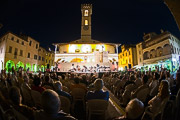
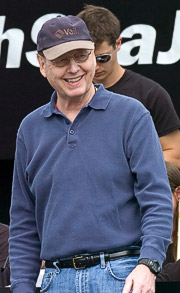 "As far as you could see, there were people — a sea of faces who looked like they were really thrilled to see us," Neil Slater says.
"As far as you could see, there were people — a sea of faces who looked like they were really thrilled to see us," Neil Slater says.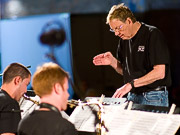 At UNT, Slater was instrumental in establishing a master of music degree in jazz studies and expanded the UNT Jazz Lecture Series, which has featured legendary musicians such as Dizzy Gillespie and Slide Hampton as performers and teachers. The band's performances across the world helped keep the program in an international spotlight and allowed students to play in the same venues with the heroes of their profession.
At UNT, Slater was instrumental in establishing a master of music degree in jazz studies and expanded the UNT Jazz Lecture Series, which has featured legendary musicians such as Dizzy Gillespie and Slide Hampton as performers and teachers. The band's performances across the world helped keep the program in an international spotlight and allowed students to play in the same venues with the heroes of their profession.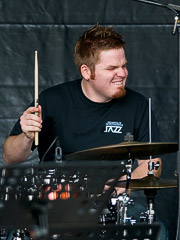 "He was bringing that reality that when you leave this school to pursue a jazz career in New York, your competition is going to be with all those other already-well-established jazz artists," Ries says. "It was for me a perfect transition. He gave me suggestions about people to call. Personally, for me, that was great. It was a wake-up call."
"He was bringing that reality that when you leave this school to pursue a jazz career in New York, your competition is going to be with all those other already-well-established jazz artists," Ries says. "It was for me a perfect transition. He gave me suggestions about people to call. Personally, for me, that was great. It was a wake-up call."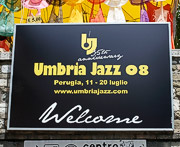 In preparation for this year's European tour, students met in five intense rehearsals in the days before the trip. The tour included performances at the Brienz and Montreux jazz festivals in Switzerland, the Vienne Festival in France, the Rüdesheim in Germany, the North Sea jazz festival in the Netherlands, and the Tuscany and Umbria jazz festivals in Italy.
In preparation for this year's European tour, students met in five intense rehearsals in the days before the trip. The tour included performances at the Brienz and Montreux jazz festivals in Switzerland, the Vienne Festival in France, the Rüdesheim in Germany, the North Sea jazz festival in the Netherlands, and the Tuscany and Umbria jazz festivals in Italy.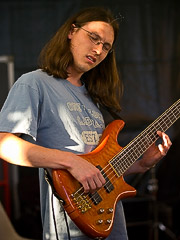 "You always have to bring it, no matter the circumstances, no matter how tired you are," Bullock says. "We dealt with a lot of those things — jet lag, not getting an ample amount of sleep, being on the bus all day and then having to play challenging high-energy music. But once you get onstage and you have your horn in your hand, everything that happened earlier doesn't matter. You are there to play."
"You always have to bring it, no matter the circumstances, no matter how tired you are," Bullock says. "We dealt with a lot of those things — jet lag, not getting an ample amount of sleep, being on the bus all day and then having to play challenging high-energy music. But once you get onstage and you have your horn in your hand, everything that happened earlier doesn't matter. You are there to play."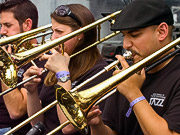 "Neil wants the best out of everybody, and if you don't give him the best, he lets you know that's unacceptable," Jacovino says. "He doesn't even need to say much, you just know. He's direct but there's always a lot of insight, even if he gives you just a look, a disapproving look, or a look that says, 'I like that.'"
"Neil wants the best out of everybody, and if you don't give him the best, he lets you know that's unacceptable," Jacovino says. "He doesn't even need to say much, you just know. He's direct but there's always a lot of insight, even if he gives you just a look, a disapproving look, or a look that says, 'I like that.'"